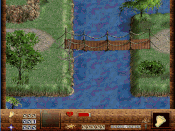Reply to Re: Is there a name for Dink's world?
If you don't have an account, just leave the password field blank.
One thing you're correct about is that we can't be sure the newest found skeleton actually corresponds to the time the very last dinosaur died; in fact, that's very unlikely. However, so many animals disappearing from the fossil record at the same time represents an extinction event, not to mention the corresponding crater.
Furthermore, radiometric dating is startlingly accurate, yes. Carbon 14 dating is used to tell how old more recent things are (its half-life being far too short to date things like dinosaur fossils), and it's the hardest kind of proof there is. It's possible for certain kinds of soil content to skew the results a bit in older samples, but not very much.
As for the origin of modern humans, there is tremendous evidence supporting Africa as the location where the modern human population arose. There IS some credible debate about the exact location, but pretty much everybody agrees on the continent at this point. Populations of humans and hominids elsewhere (not anatomically modern humans, but neanderthals, homo erectus, and so on) were forced out by the dispersal of this African population, which is why this is known as the "out of Africa" theory (theory, at least of the sort I'm talking about here, being the most well-confirmed type of scientific explanation - I know it's rather confusing, I wish they'd improve their terminology too). The evidence for this doesn't just come from the fossil record (itself a very strong case, as well-developed as the record is today) - it comes from the study of mitochondrial DNA and the Y chromosome, which don't get mixed around like the rest of our genetic material at reproduction.
I haven't had anything force fed to me. Anything, even these assertions, can be disproven, but the mounting evidence makes that more and more unlikely. Not everything in "mainstream" scientific thought, as you put it, is so concrete as the things I just talked about, but we're speaking of some of the most well-confirmed theories out there. It's difficult for me to understand how you can scoff at such rigorously tested bodies of evidence as the fossil record while holding up as proof bits of conjecture. Dragons were not dinosaurs, and in many cases don't even look like them.
As for the other animals you mentioned, they're more distant relations from them than birds are. Crocodiles are an interesting one to bring up, actually, because they share a common ancestor with dinosaurs relatively recently (250-225 million years ago) and if the definition of "dinosaur" were somewhat broadened, they might be called dinosaurs the same way they're doing with birds (which I'm not convinced is totally justified, but whatever). So it's no coincidence that crocs look like dinos. Turtles, on the other hand, lived alongside dinosaurs and are not particularly close relations.
I'm sorry; I've held my tongue on some topics around here, believe me, but I can't keep my mouth shut on this one. I believe in observable (measurable) reality, and I take it very seriously. Without that, where are we?
Furthermore, radiometric dating is startlingly accurate, yes. Carbon 14 dating is used to tell how old more recent things are (its half-life being far too short to date things like dinosaur fossils), and it's the hardest kind of proof there is. It's possible for certain kinds of soil content to skew the results a bit in older samples, but not very much.
As for the origin of modern humans, there is tremendous evidence supporting Africa as the location where the modern human population arose. There IS some credible debate about the exact location, but pretty much everybody agrees on the continent at this point. Populations of humans and hominids elsewhere (not anatomically modern humans, but neanderthals, homo erectus, and so on) were forced out by the dispersal of this African population, which is why this is known as the "out of Africa" theory (theory, at least of the sort I'm talking about here, being the most well-confirmed type of scientific explanation - I know it's rather confusing, I wish they'd improve their terminology too). The evidence for this doesn't just come from the fossil record (itself a very strong case, as well-developed as the record is today) - it comes from the study of mitochondrial DNA and the Y chromosome, which don't get mixed around like the rest of our genetic material at reproduction.
I haven't had anything force fed to me. Anything, even these assertions, can be disproven, but the mounting evidence makes that more and more unlikely. Not everything in "mainstream" scientific thought, as you put it, is so concrete as the things I just talked about, but we're speaking of some of the most well-confirmed theories out there. It's difficult for me to understand how you can scoff at such rigorously tested bodies of evidence as the fossil record while holding up as proof bits of conjecture. Dragons were not dinosaurs, and in many cases don't even look like them.
As for the other animals you mentioned, they're more distant relations from them than birds are. Crocodiles are an interesting one to bring up, actually, because they share a common ancestor with dinosaurs relatively recently (250-225 million years ago) and if the definition of "dinosaur" were somewhat broadened, they might be called dinosaurs the same way they're doing with birds (which I'm not convinced is totally justified, but whatever). So it's no coincidence that crocs look like dinos. Turtles, on the other hand, lived alongside dinosaurs and are not particularly close relations.
I'm sorry; I've held my tongue on some topics around here, believe me, but I can't keep my mouth shut on this one. I believe in observable (measurable) reality, and I take it very seriously. Without that, where are we?









